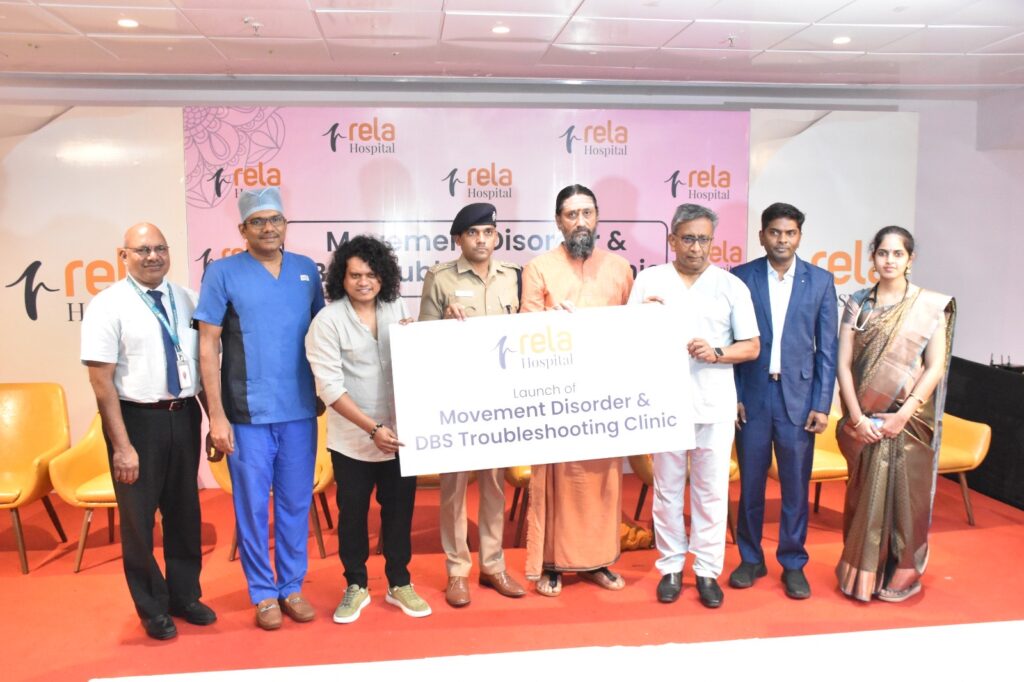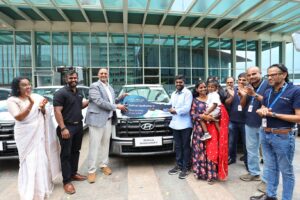Chennai, April 10, 2024: Rela Hospital, a leading multispecialty hospital in the city, has inaugurated Movement Disorder & DBS (Deep Brain Stimulation) Troubleshooting Clinic for Parkinson’s patients. The clinic will evaluate and provide advance care like IMAGE GUIDED PROGRAMMING for optimal results after DBS, Botulinum toxin, and Apomorphine therapy for those in need.
Prof. Mohamed Rela, Chairman and Managing Director, Rela Hospital presided over the inaugural function while Sri Sannyasi Shiva Rishi, Founder of Satyananda Yoga Centre, took part as the Guest of Honour. Mr. Pavan Kumar Reddy IPS, Deputy Commissioner of Police, Tambaram, and Mr. Pugazh, an actor and comedian were the chief guests.
The inauguration was followed by a yoga session in which about 100 patients and their family members performed therapeutic yoga asanas designed exclusively for motor and neurological conditions. To mark World Parkinson’s Day, which falls on April 11, annually, Rela Hospital has announced free consultations for Parkinson’s and Movement disorder patients till April 30, 2024. For appointment: 044-6666 7777.
Parkinson’s disease is a brain disorder that causes unintended or uncontrollable movements, such as shaking, stiffness, and difficulty with balance and coordination. It occurs when nerve cells in a part of the brain – known as the basal ganglia, responsible for controlling movement, become impaired and or die.
Although there is no cure for Parkinson’s disease, there are medications, and surgical treatments to provide relief to patients. Implantation of DBS is usually recommended when patients do not respond well to medications. DBS is like a pacemaker for the brain. While pacemakers send electrical signals to the heart, DBS sends signals to the brain. These signals can help in getting the symptoms under control and thus improve the quality of life of patients. However, DBS may develop snags, produce unwanted effects or require optimization . Troubleshooting clinics will help in maximizing the benefits of deep brain stimulation.
In his comments Prof. Mohamed Rela, said, “Parkinson’s is an age-related progressive disorder of the brain. It affects one in a hundred people who are 60 years or above. Though there is no permanent cure for the condition, patients affected with this disease can lead a normal life with advanced medical intervention. We have an exclusive Movement and Mobility department in our hospital which is run by a team of specialists. We provide all advanced treatments including the implantation of DBS. The newly-opened DBS troubleshooting clinic will help us enhance our care. At Rela, we also integrate yoga asanas in the treatment that gives excellent medical outcomes for our patients.”
Sri Sannyasi Shiva Rishi commented, “Only a holistic approach to healthcare can bring qualitative relief to patients with chronic and lifestyle disorders. These conditions demand attention not only to the repairing of the body but also mental and emotional rejuvenation. Yoga asanas increase the flexibility of the body, relaxes the stiffened muscles and joints, eliminates toxic, and soothes the mind. I am happy that Rela Hospital is open to such an integrative treatment for the management of Parkinson’s and other neurodegenerative conditions. Patients and the public should come forward to make yoga asanas as an integral to their life and benefit from the ancient wisdom.”
In his address, Dr. Shankar Balakrishnan, Clinical Lead, Department of Intervention Neurology, Rela Hospital, said that early diagnosis and treatment are important for the better medical outcomes in Parkinson’s patients. “Although most people with Parkinson’s first develop the disease around age 60 or older, about 5% to 10% experience its onset before the age of 50. Some cases of Parkinson’s disease appear to be hereditary, and a few cases can be traced to the environment. We should pay special attention to the people who are in the at-risk age group for the four main symptoms: 1) tremor in hands, arms, legs, jaw, or head; 2) muscle stiffness, where muscle remains contracted for a long time, 3) slowness of movement, and 4) impaired balance and coordination, sometimes leading to falls.”
He added that this disease is primarily genetic but exposure to toxic air, water, and metals in food is also linked to its development. Besides medical treatment, it is important for the patients to undergo physical, occupational, and speech therapies, have a healthy diet, exercise regularly to strengthen muscles and improve balance, flexibility, and coordination. They can also try massage therapy to reduce tension, and yoga to increase stretching and flexibility.







More Stories
Iswarya Hospital, Chennai Successfully Removed 6 cm Tumor from Heart of a 63-Year-Old Man
விளையாட்டுத் திறமைகளை கொண்ட மாணவர்களையும் உடற்தகுதி ஆசிரியர்களையும் வெலம்மாள் நெக்சஸ் பாராட்டுகிறது
தமிழ்நாடு ஆதி ஆந்திரா அருந்ததியர் மகாசபா துணை தலைவர் ஊட்டுகூரி தேவதானம் அவர்களின் பிறந்தநாள் விழா